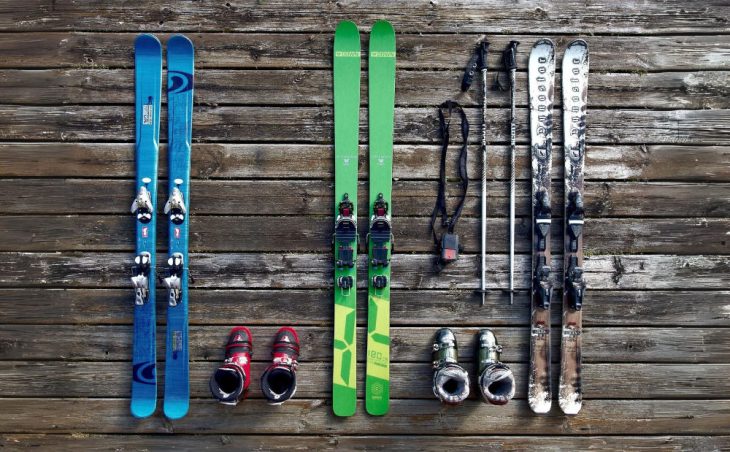Does this sound like a familiar scenario? You get back from your ski and snowboard trip, do a bit of washing and chuck your mountain clothes into a bag. Then, along with equipment and boots – if you have them – store it all in the back of a cupboard, in the garage, or up in the attic where it stays for 12 months until next season.
Table of Contents
- Clean Everything
- Dry Thoroughly
- Repair Any Damage
- Store In A Cool, Dry Place
- Use Breathable Storage Containers
- Avoid Compression
- Hang Jackets And Pants
- Fold Base Layers And Accessories
- Store In A Dark Place
- Use Mothballs
- Equipment
- Clean And Dry
- Bindings
- Wax On
- Store Upright
- Cool Boots
- Avoid Extreme Temperatures
- Summary
As the majority of us only use our ski and snowboard kit for one week of the year, taking care of it is not top of most people’s ‘to-do’ list. But clothing and equipment do not come cheap these days, so taking the time to properly store your gear at the end of the season helps maintain its quality and ensures it’s ready for use when the next winter comes around.
Here are a few tips which will help keep your gear in shape until you need it again.
Clean everything
Before storing, make sure all your ski and snowboard clothing is clean. This includes jackets, pants, base layers, gloves, socks, and any other items. Follow the manufacturer’s instructions for washing and drying to ensure you don’t damage the fabrics.
Dry thoroughly
Ensure all clothing items are completely dry before storing them. Moisture left in the fabric can lead to mould and mildew growth, which can ruin your gear.
Repair any damage
Before storing, check all your clothing for any signs of damage, such as rips, tears, or broken zippers. Repair any issues to prevent them from getting worse.
Store in a cool, dry place
Choose a cool, dry location for storing your ski and snowboard clothing. Avoid areas that are prone to moisture or extreme temperatures, as this can damage the fabrics.
Use breathable storage containers
If possible, store your clothing in breathable storage containers or bags. Avoid using plastic bags, as they can trap moisture and lead to mildew growth.
Avoid Compression
It’s always tempting to stuff as much clothing as you can into a bag, but you should try not to compress your clothing too much when storing it. This can cause wrinkles and creases that may be difficult to remove later on.
Hang jackets and pants
Hang your ski and snowboard jackets and pants on padded hangers to help maintain their shape. If possible, avoid using wire hangers, as they can cause creases and damage to the fabric.
Fold base layers and accessories
Fold your base layers neatly and place them in a storage container or drawer with gloves, hats, and other accessories.
Store in a dark place
Keep your stored clothing away from direct sunlight, as prolonged exposure can fade the colours and weaken the fabrics.
Use mothballs
If you’re storing your clothing in an area prone to moths or other pests, consider using mothballs to deter them.
Equipment
The way you store your skis, snowboards, and boots at the end of the season is crucial if you want to ensure they remain in good condition for the next season.
Clean and dry
Before storing, make sure to clean your equipment and boots thoroughly. Remove any dirt, mud, or snow from skis and snowboards, and wipe down your boots inside and out to remove any moisture or debris.
Allow your equipment and boots to thoroughly dry before storing them. This helps prevent rust, mould, and mildew, which can damage your equipment.
Bindings
Check your bindings to ensure they are in good condition. If there are any issues, it’s best to get them serviced before they go into storage.
Wax on
Apply a coat of wax to the base of your skis and snowboards to protect them during storage. This helps prevent the base from drying out and keeps them ready to be serviced before next season’s mountain holiday.
Store upright
Store your skis and snowboards vertically. This helps prevent warping.
Cool boots
Store your ski and snowboard boots in a cool, dry place away from direct sunlight. Loosen the buckles and straps to relieve tension on the plastic shell during storage. This helps prevent the boots from becoming misshapen.
Avoid extreme temperatures
Avoid storing your equipment in a place that may be subject to extreme temperatures, as this can cause damage to the materials. Before hitting the slopes again, inspect your skis and ski boots for any signs of damage or wear. If necessary, have them serviced or repaired.
Don’t Pack Up Trouble In Your Old Kit Bag: A Summary
By following these tips, you can ensure that your ski and snowboard clothing stays in good condition during the off-season and is ready for use when the snow starts falling again.
Chat with our experts
For tips and advice on booking your next ski holiday, call our expert sales team on:
020 8313 3999 All Ski Deals
All Ski Deals
